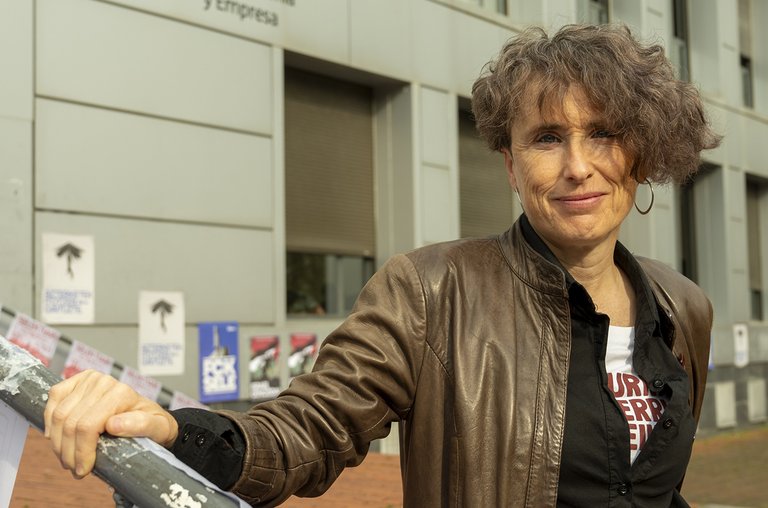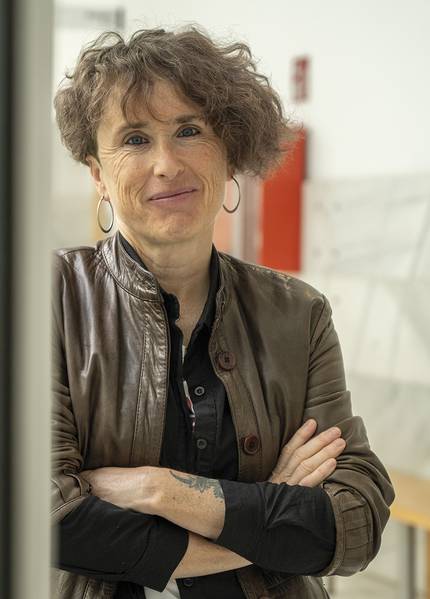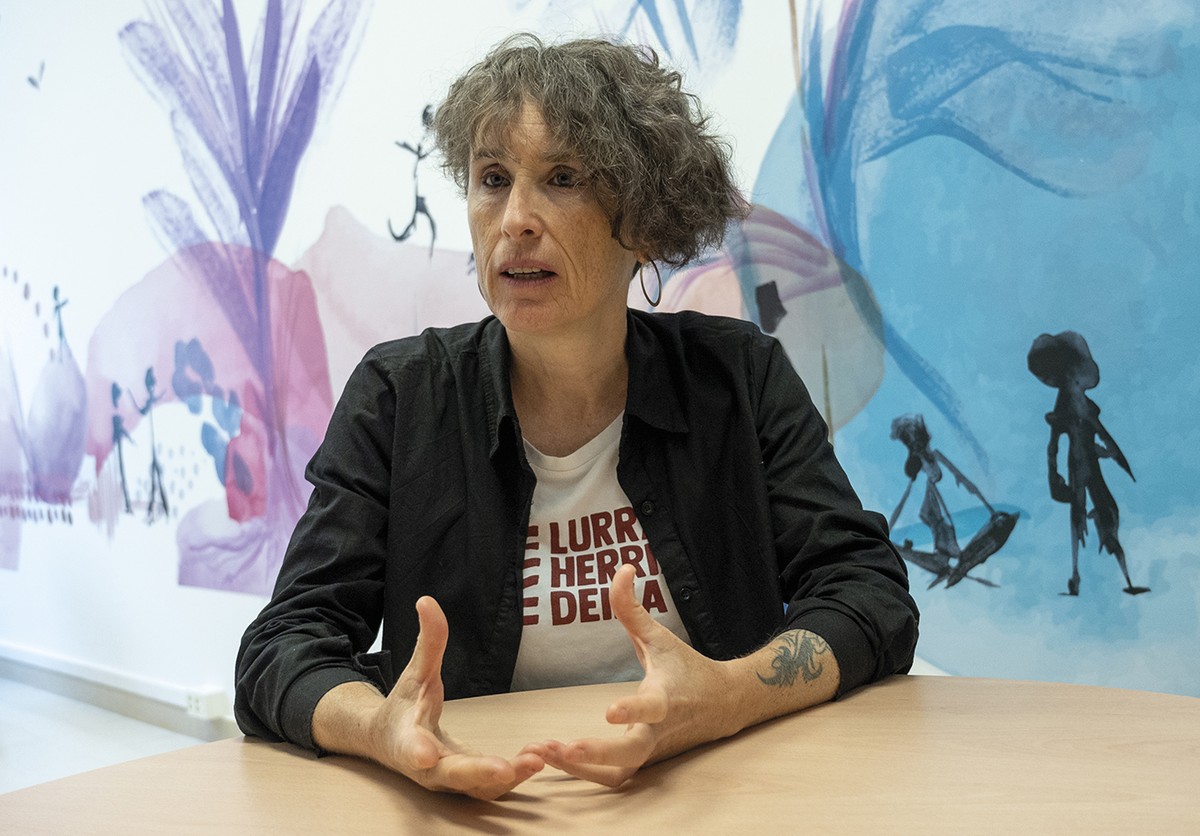“Economics is a social science, so we have a choice of where to go.”
the objective of the colloquium cycle “In the light of women scientists” is to publicize the trajectory of women scientists, as well as to socialize their vision of the field in which they are researching, in order to spread scientific culture and promote critical debate. Organized by Elhuyar and Donostia Kultura, the feminist economist Mirene Begiristain Zubillaga was the protagonist of the last session of the spring cycle. Elhuyar magazine has compiled in its pages significant passages selected from that conversation.

You studied economics at the University of the Basque Country and are now a professor of economics at the Faculty of Economics of the University of the Basque Country. Your discourse and practice, however, are critical of the hegemonic vision of academia. How have you evolved?
I started working in the Faculty of Economics and Business at the UPV/EHU in 1998 and, although some years have passed since then, what is taught today is still based on the hegemonic model. That’s a big concern I have and have had.
I have always been interested in the social issues of my time. When I entered the UPV/EHU to work, I started on cooperative issues, but immediately, when I chose the line of research, I became involved in agriculture. At the time, GMOs were the subject of much controversy; today I would say that the agricultural model is the main issue at issue.
I was already a member of Bioearth. Biolur is the association of organic farmers of Gipuzkoa and is also a citizens’ association, I became a member in 1997. I have reflected on this later, how personal concerns and professional choices have gone hand in hand.
An example of this is that in 2006, as part of this line of university research, we from Biolur made a trip to Andalusia. We were looking at ways of marketing at the time and one of the main problems facing farmers was how to market their food produced in organic farming. And we went there, because the Andalusian government at the time had a very interesting program going on, school canteens and things like that. From there, a series of projects began in the territory, including consumer groups (lobster).
At that time, we were not aware that we were doing agroecology there. Because it wasn’t just about producing organic food; we were doing more than that. There were social concerns, the consumption of local products, the guarantee of decent conditions for local farmers, the creation of a network, the maintenance of the local rural area... And there were still not so many studies or looks linked to rural women on the front lines. But in those projects, in general, we were pushing women.
I also participated in the Uztaro cooperative. In Beizama, we reached 80 family units. We had a collective garden and we worked for many years, until 2016. We made a beautiful family. Today, these lands are home to the Aleka project, one of the few ecological seed projects in the Basque Country.
He also submitted his doctoral thesis that year. He mentioned some of the studies and projects carried out from there: fairs, food sovereignty projects, sustainable food purchases in hospitals, the Duina study and the Amillubi project.
My thesis topic was agroecological marketing. Analyzing the situation of the farmers, as well as the case of Biolur, of Uztaro and several existing in the state, we came to different conclusions. I learned a lot in terms of methodology and indicator systems and it has been very useful for many of the research projects we have carried out in the following years.
Since there are very few people who read the theses, in 2018 we launched a manual by the Hegoa Institute. And we have also published books, with the Council of Organic Agriculture, to plan the commercialization of farmers. They are all available online, as well as scientific articles, known as high-impact articles.
For example, in marketing or marketing, fairs have traditionally been the most important means for farmers. We, in 2016 and beyond, studied the economic-social impact of the fairs and found that the fairs have an impact not only on the day of the fair, but beyond because they generate the town. Therefore, they have positive economic and social impacts and, if the products sold have been cultivated in organic agriculture, they also have a beneficial effect on the land. The fairs are a reflection of the farm.
In the area of food sovereignty we have been dealing with this type of issue, where we have also created very nice groups, with the help of the Chamber of Agriculture, and with agents from the South and the North of the Basque Country. For example, there is the food strategy we worked on with the City Council of Azpeitia, Orduña
Urduña, for example, is a reference in food sovereignty. They have a communal kitchen from which they serve the school, the residence of the elderly, the citizens who are in their homes; and they work intensively on the waste of food. The market is also there. A meat processing area has recently been opened by farmers and several young people are taking part in the integration programme.
In recent years, we have worked with another member, Goiuri Alberdi, on the sustainable purchase of hospital food through the study of the food system in several European hospitals. We have also made a proposal for Osakidetza.
On the other hand, being a member of the Bioterre, we have had a great exchange on many issues, and to mention one, in recent years the Dignified research has been significant. It analyses the socio-economic viability of 11 horticultural projects in Gipuzkoa and Bizkaia: crop production costs, wages, working hours, decent prices, and in general it delves into various data for the economic and social dignity of agricultural projects.
Now we are working on the Biolur project, Amillubi. Urola is a strategic collective project that has emerged in the Costa, in the town of Zestoa and in the meandering of the Urola River, a proposal for food sovereignty in Gipuzkoa. It is a farm of nine hectares of land that Biolur, a non-profit association, has acquired to contribute to the local food sovereignty strategy.
It places all these projects within the transformative economy. Thus, he explains what a transformative economy is and also talks about ecofeminism.
We have always worked on all these projects from the perspective of the transformative economy, based on agroecology, but with an expanded prism. Capitalism is in crisis. And economics is a social science that determines where society can go, so we have the opportunity to decide. This is where we propose: the development of the economy, with natural systems at the center and all lives at the center; and not capital, above life or in collision with life.
In this sense, the last line of work is experiencing ecofeminism. Four years ago, Contigo organized a round table during the summer courses in which I was invited to talk about the ecosocial crisis, the decline and ecofeminism. At the time, I had worked on feminist economics, ecological economics, agroecology and these issues, but working on ecofeminism as such was a lot of work.
The first post came out, and it’s been four years since then, and we’ve been through an incredible process. Not just me, I've been surrounded by so many other people. It has been a very fruitful exercise and this year we are going to launch a book in the Lisipe collection (Susa).
We have learned and thought a lot, we have resorted to practices, even social movements. That’s where that thought will come from. This is how I would shorten my professional and personal career.
Somehow, you have resorted to the original meaning of economics, haven’t you?
Economics actually means house management; how we want to govern the house.
In the feminist economy there is the metaphor of the iceberg: from the perspective of the feminist economy, what we understand today as an economy is only the part of the iceberg that remains on the water. We only see that, and that’s the only thing that gives it value. And what is underwater, invisible? Natural resources; the jobs that are done at home and in the community; the jobs of those who have stayed with their children to be here today; various jobs that we do without money... They have no value. But the economy is everything.
When I saw that the icebergs are turning around, I thought that maybe this should be done with the economy: put the bottom in sight. In my opinion, the iceberg must explode in order to build dignified lives, and we must truly transform and organize ourselves in a different way. And instead of talking about sectors, we should bring other concepts: what is the real need, what is work, what is life, what is good life, what is family, what is a species. We should rethink many concepts, and then the iceberg no longer serves us.
It is important to recover the meaning of words and concepts.
Since you have claimed the meaning of the words, and we are talking about agroecology, what is agroecology?
In order to understand agroecology, we need to understand what the food system itself is, and it is closely linked to food sovereignty. The food system is often understood in a linear way: some produce, others sell and others consume. And more and more, large corporations take over production and consumption, and somehow control a large part of the system.
That’s what we’ve problematized. On the one hand, consumption does not end with buying, and households and natural systems are also part of this food system. I mean, it's a circle, it's not linear.
In the other model, in agribusiness, large food distribution companies dictate to family producers what to produce, when to produce, under what conditions to produce, and at what prices to produce. And they tell us consumers what to eat and when, from what they put on the shelf. In fact, today, most of the food is still bought in supermarkets. Who in the house is holding it? In reality, the natural systems are the supports, but in the agro-industrial system the impacts generated in them and their value are not taken into account.
Therefore, what is called the food chain is not so simple. We have to introduce natural systems, we have to introduce homes, we have to introduce communities. And we have to consider the relationships that exist between them, considering that the current relationships are hierarchical and are not fair.
How much influence do institutional policies have on this?
The big one. One of the problems that is mentioned is the artificialization of the earth. In the Basque Country, more than 80,000 hectares have been artificialized in the last 30 years. In the last 30 years, we have lost more than half of our farms. There were thousands of them in Gipuzkoa. And this is linked to what is called the Common Agricultural Policy that comes from Europe, which determines the agricultural model that is promoted.
However, we need a food policy rather than an agricultural policy. And a territorial policy, which is closely linked to territorial planning. The current territorial organization raises the question of food and agroecology. It is very worrying, for example, how after the pandemic, with the arrival of Next Generation grants, the strategic plans were launched and the lines that have been promoted in the Basque Country in relation to these strategic plans have been mostly linked to digitalization.
And it's contradictory. In fact, there are two other strategies in Europe linked to the Green Deal. One is the Farm-to-Table strategy, and the other is the biodiversity strategy. One of the criteria established by the first is that 25% of agricultural land should be in the ecological zone by 2030. Currently, this is five years away, with 5% being ecological in the Basque Country and 7.4% in Navarre. I don’t know, we don’t have that data. Even the country is organized differently. There are other problems due to tourism.
Your research from the university seems to me to offer a very solid grip for other models, or? Is science worth anything?
What is Science? That's the question. But yes, food strategies are written. We have written research and innovation strategies for sustainable food systems in the Basque Country. Agricultural trade unions have also drafted the necessary agro-ecological strategy for 2030. And, as I said, strategies are also written for Osakidetza. We have always invited public officials and members of public institutions to these reflections, and sometimes they have come. The thing is, we're talking about something complex.
Now here we are focusing on agroecology, but the look should be integral. It captures so many areas... but because they are policy-makers by discipline and area... For example, the example of school canteens is very useful to understand this: They are the responsibility of the government, where the competences of the Department of Health, the competences of the Department of Education, the competences of the Department of Agriculture intersect. There is no agreement there. For years and years, several parents, platforms, social agents, have done research to be able to promote it, and it has not been carried out. Add to this the territorial planning and economic interests of transport and catering companies. Then it becomes very complex.
So, although there are studies that show the positive effects of a healthy diet on health, the economy, the territory, socially... why do we have this model in school canteens?
And I was wondering what science is, because what we investigate, who we ask, all that has to be taken into account. For example, who has knowledge? Knowledge is not only in academia. There is a knowledge in the Academy that, in this trajectory of these years, we have resorted more to what we call feminist objectivity. That is, you always do research from a certain place, with a certain look, and it is always partial. That’s why we need participatory and interdisciplinary methodologies. But often, if you present interdisciplinary projects, they are rejected. Science today has the hallmark of the patriarchal system.
What is objective, what is science, who makes science, where is knowledge, what is neutral, who and for what and for whose benefit, quantitative/qualitative, mind/body, is all in that dichotomy. We have published in high impact journals. Our research is there, the strategies we’ve published are there. In this science has a lot of evidence.
But the power is also somewhere else.
That's the thing, yeah. And the track will be to follow. For example, the European Farm-to-Table strategy mentioned above states that 25% of agricultural land must be organic within five years, while in the Basque Country there is currently 5%. It is interesting to track this data. For example, what will they include as organic agriculture?, they want to reach 25%.
We have a lot at stake, and I think we can do a lot from our place. But one will not change anything on his own. We have to do it collectively in order to guarantee this leap of scale. And public policy can give a huge boost. We must try to do this, to broaden our gaze and to articulate it collectively.
Buletina
Bidali zure helbide elektronikoa eta jaso asteroko buletina zure sarrera-ontzian













